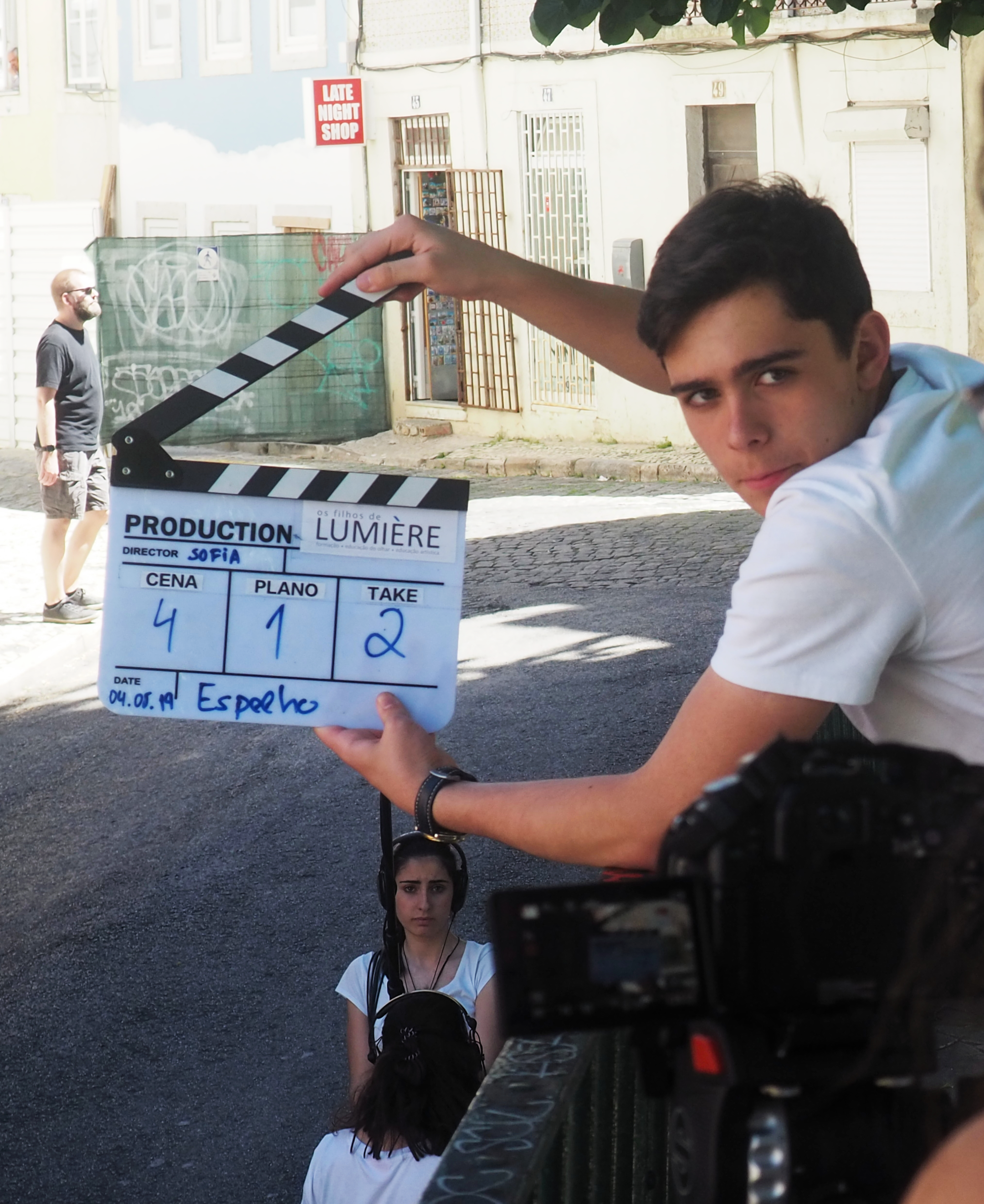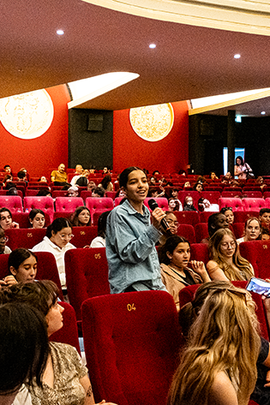|
|
Presentation: 2 or 3 things we know about CCAJ |
||||||
EXPLORING CCAJWhen the Cinémathèque Française withdrew from the project in 2021 hundreds of film professionals, archivists, academics and participants in the project all made their voices heard to express their desire that the project should continue. The CCAJ has worked to ensure that it can continue to offer workshops from the start of the 2021 school year. Le Cinéma, cent ans de jeunesse is now managed by the CCAJ! association, in partnership with Est Ensemble, the Université Sorbonne Nouvelle and Documentaire sur Grand Écran in Ile de France, as well as the Deutsches Filminstitut & Filmmuseum (DFF), the Lichtspiel association in Frankfurt, and the Compagnie d'avril in Martigues. The DFF will soon launch the Erasmus + project "Exploring Cinéma, cent ans de jeunesse" (E*CCAJ). It brings together a consortium of cultural institutions and schools across Europe, in Germany, France, Bulgaria and Portugal and involves universities, Sorbonne Nouvelle - Paris 3 and Bremen. E*CCAJ aims to extend and deepen the CCAJ’s offer, to implement a reflection on film education through its impact and its evolution in cooperation with the universities. |
 |
...when I took part in a CCAJ's workshop, of my first shot, of the screening of my film at the Cinematheque française, and many other things that left me a vivid memory! For the 25th anniversary of the program, some boys and girls give their impression here and on the blog.
|
Noah, Sainte-Anne, France |
Zacharie, Saint-Martin-d’Hères, France |
Lucia, Barcelona, Spain |
|
Tiago, Serpa, Portugal |
Noémie, Emma and Alice, Paris, France |
El Hadji, Paris, France |
|
|
1994-19951995 marked the centenary of the invention of the Cinematograph by the Lumiere Brothers. At the start of the project, there was a desire from certain film practitioners, teachers and institutions to develop a system of teaching cinema which developed the basis of a cinematic regard alongside the practical experience of creating films. Three archival centres, La Cinémathèque Française, L’Institut Lumière and La Cinémathèque de Toulouse and one cinema, L’Eden-le Volcan in Le Havre came together to create a project called le Cinéma, Cent Ans De Jeunesse, which was included in the Premier Siècle du Cinéma initiative. The founding members of the project were: Alain Bergala, Nathalie Bourgeois, Carole Desbarats, Ginette Dislaire, Thierry Frémaux, Béatrice de Pastre and Catherine Schapira. The first workshops took place throughout the 1994-95 school year, in 4 regions of France. From this experience was born the film Jeunes lumières [Young Lumieres], which was presented at the Cannes Festival in 1995 and then shown at various other festivals and cinematheques. The film brought together 60 Lumiere Minutes, sourced from 300 films made by children and adolescents on Super 8 in their workshops throughout France. It was co-directed by Nathalie Bourgeois and Valérie Loiseleux (60’, 35mm, France, 1995, a co-production between Cinéma, Cent ans de Jeunesse and Agat Films & Co.). |
||
1996The project becomes permanent. La Cinémathèque française funds and coordinates the project, developing its education and outreach work for young people in doing so. From 1996 to 2005, several regions of France come on the project's board, some staying for the whole journey, others dipping in and out. 2000In the context of the Mission d'éducation artistique et d'action culturelle (Arts education and cultural mission) established by Jack Lang, Alain Bergala published a reference book: « The Cinema Hypothesis: Teaching Cinema in the Classroom and Beyond » (by Cahiers du cinema, 2002 ; translated in numerous languages). |
|
||
All the questions
Lumière Tendency / Méliès Tendency Otherness in cinema Off-screen sound Filming gestures Real and filmic space Real and filmic time The place of the actor in mise-en-scène The shot Editing and linking shots Light Relation between figure and background Point of view Colour Camera movements Hidden/Shown The place of reality in fiction Mise-en-scène The sequence-shot The interval Climate Playing Places and stories The situation The sensation The time The motifs Centred / Decentred Filming the Other - The Documentary Gesture Individual, group, community Living somewhere (here and elsewhere) |
2005Le Cinéma, cent ans de jeunesse opens up to European partners, with the addition of Spain and other Mediterranean nations, soon to be joined by other Western European countries, then Northern nations and finally central Europe and Eastern European countries. 2010The project becomes international and develops in Latin America, Brazil, Cuba and Mexico. French territories come aboard with the addition of the French Antilles. 2014La Cinémathèque française, by way of Le Cinéma, cent ans de jeunesse, takes part in new European projects, receiving the support of Europe Creative – Framework for Film Education / CinEd / Inside Cinema. 2016The Cinéma, cent ans de jeunesse website launches, offering a host of educational resources inspired by the project’s experimental history and for the first time is free for any one anywhere in the world to access. The site is translated from French into English through partnership with Scottish Film Education and the British Film Institute. 2017Asia joins the CCAJ project for the first time with the inclusion of partners from India and Japan. Paulo Pastorelo’s film Viva o Cinema! (83 mins, produced by Escola Carlitos & Ebisu films) follows the course of a year in the life of a group working on the project in Sao Paulo, is released in Brazil and features in the 30th Tokyo International Film Festival. |
||
2021The CCAJ website becomes trilingual french/english and spanish, thanks to the partnertship with the French Institute of Argentina. The CCAJ is now present: in Europe (Germany, Belgium, Bulgaria, Spain, Finland, France, Greece, Italy, Lithuania, Portugal, United Kingdom: England and Scotland), in South America (Argentina, Brazil, Chile, Colombia, Mexico, Uruguay), Canada, India and Japan. At the end of the 2020-2021 season, the Cinémathèque française decided to disengage from the programme. The association Cinéma, cent ans de jeunesse! is created to enable the programme to continue. A partnership is set up with the cinemas in the Est Ensemble group. |
|||
 |
2023For the first time, the international meetings "À nous le Cinéma !" are held outside France, at the Caligari Filmbühne in Wiesbaden, a partner cinema of the DFF - Deutsches Filminstitut & Filmmuseum in Frankfurt. 2024Le Cinéma, cent ans de jeunesse is now present in Africa, with the participation of the association Cinema TAKE in Johannesburg (South Africa). The International Meetings "À nous le cinéma !" are hosted for a week in Lisbon by the Cinemateca portuguesa, in collaboration with the association Os Filhos de Lumière. 2025For CCAJ's 30th edition, the "À nous le cinéma !" Meetings took place at the Sorbonne Nouvelle, in Paris, a partner university in the programme as part of an Erasmus + project. |
|||
|
|
|
|||||||||
« A nous le cinéma ! » ["Our cinema!"] - A 3 to 5-day festival of international meetings is held every year in June , bringing together workshop participants - students from all regions and countries, accompanied by their teachers and filmmakers. All the films made in the workshops are screened in one of the programme's partner cinemas in France or Europe. Last trailers for the sharings:
|
• A nous le cinéma ! 2025 Trailer |
• A nous le cinéma ! 2024 Trailer |